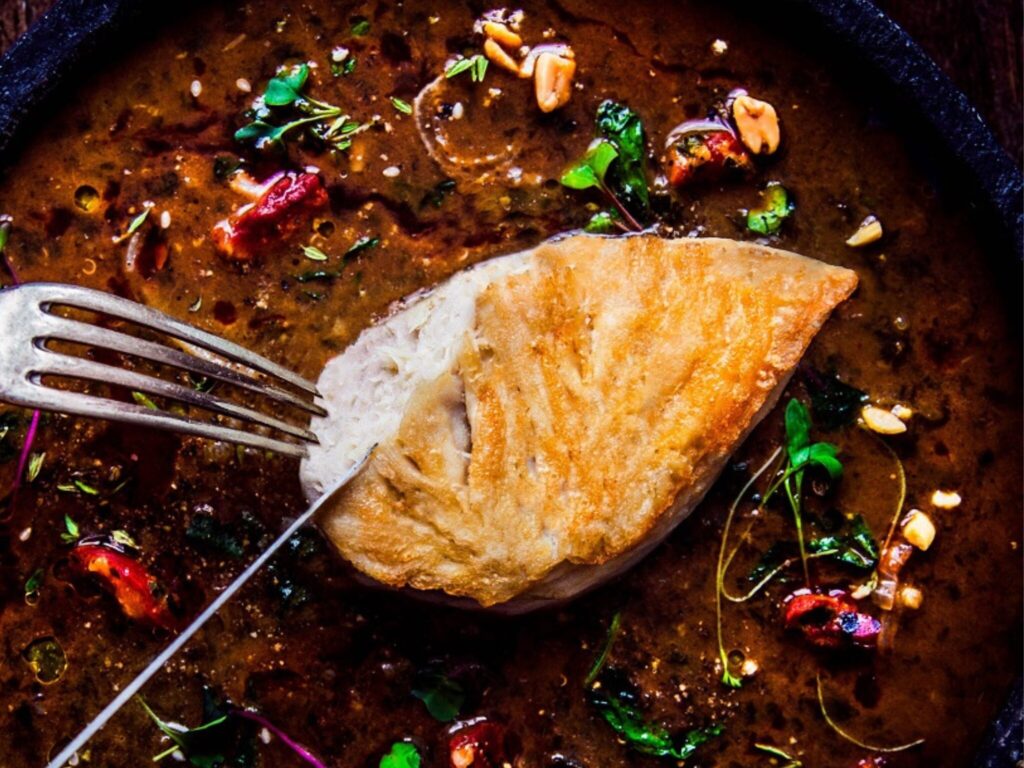French People Are Eating 6% Less Meat Than They Were 20 Years Ago
5 Mins Read
Per capita meat consumption is down by nearly 6% in France, though a possible far-right government has dented climate hopes.
French people are eating less meat than they used to – especially beef – although it’s still much higher than the national dietary guidelines.
Figures released by the statistics department of the ministry of agriculture and public body FranceAgriMer show that per capita meat consumption fell by 5.8% from 2003 to 2023, reaching 83.5kg.
Although overall intake – including beef, pork, poultry, lamb, etc. – has risen over the 20-year period, this increase has been slower than the population growth, indicating that each French citizen is, on average, eating less meat.
France turns to chicken, but overall meat intake is down

The decline has particularly affected beef intake, which dropped by 19% from 2003, when average consumption was 26.3kg. In 2023, this was down to 21.3kg. In fact, beef and pork consumption in France reached their lowest levels in 20 years.
On the other hand, though, people are eating more poultry meat. Chicken intake has increased from 12.1 kg per capita in 2003 – when it made up 14% of total meat consumption in France – to 23.3kg in 2023 (28% of the total).
To meet this demand, France is increasingly relying on imports, which make up 50% of all chicken eaten in the country. Its incumbent agriculture minister Marc Fesneau last year also called for increased factory farming to produce cheaper meat.
But overall meat imports – while still high – dipped by 1.4% year-on-year, accounting for about 30% of all meat consumed.
The decrease in per capita meat consumption followed two years consecutive years of growth “corresponding to the post-Covid-19 economic recovery”. But French people ate 1.4% less meat in 2023 compared to the year before.
French people still eat too much meat

Based on the latest figures, France’s citizens eat about 1,600g of meat per week, much higher than the current dietary guidelines, which recommends a maximum of 500g of red meat and 150g of processed meat weekly.
The French Nutrition Society (SFN), a group that includes a host of public and private sector nutrition experts, has called on the national guidelines to suggest cutting meat consumption by at least 25% each week – a total of 450g – in the forthcoming update.
“With half as much meat, if we eat more fruits and vegetables, legumes, fruits and whole grains, we can check all the boxes in terms of nutrition,” said Granier Benoît, food policy officer at the Réseau Action Climat, which co-authored a consumption study with the SFN in February.
“Everything around us encourages us to eat a lot of meat,” Benoît said. “Even the current recommendations are not widely followed.”
Diets are responsible for 22% of France’s emissions, and research has shown that even just replacing half of our meat consumption with plant-based analogues can bring down agricultural emissions by 31%, halt deforestation and reduce biodiversity loss. “It is really essential to take into consideration this environmental dimension,” he added. “Today, many countries say it needs to be done, but very few have done it.”
The Nordic nations, Taiwan and Canada have all realigned their nutritional guidelines to better focus on plant-based foods too, and last month, Germany’s nutrition society revised its stance on veganism, calling it a “health-promoting diet”.
Far-right rise a threat to climate change

The French government has regularly taken alternative proteins – which are much more climate-friendly – as an affront. It’s already mulling a ban on cultivated meat à la Italy, and had previously passed a decree prohibiting the use of meat-related terms on plant-based product packaging. But the country’s top administrative court suspended the latter in April, casting “serious doubt” over its legality.
But fears over France’s climate ambitions – a goal to be net zero by 2050 – have heightened as the far-right has gained a stronghold in the EU. Last month’s election was a major hit for far-right parties, and badly hit the Green Party on the flip side.
It triggered a snap election in France, the first round of which saw Marine Le Pen’s National Rally (RN) party win a third of the vote. Ahead of next week’s second election round, this has left the far right – as Le Monde put it – “on the doorstep of power”.
This would be a monumental blow to the fight against the climate crisis. “The RN has no ambition in terms of the fight against climate change. It’s a vacuum. Either the party’s members are climate sceptics and deny the problem, or they ignore it,” paleoclimatologist Jean Jouzel told Le Monde.
The party has previously called the EU’s Green Deal a tool of “punitive ecology” and has pledged to dismantle it. If it gains a majority, it could “unravel progress in the energy and climate policies of the EU’s second-largest economy and weaken ambitions at a critical point in time”, states Clean Energy Wire.
Moreover, the RN wants to get rid of the Farm to Fork strategy, which it accuses of “deliberately organising the drastic reduction” of France’s agricultural output. It is in bed with France’s infamously influential Big Ag lobby, arguing in a position paper that the EU policy is “out of touch with reality”, since “the imperative of protecting nature” is taking over “the need to feed the population”.
Plant-based foods can reduce land use by 75% compared to animal-sourced foods. And in the EU, animal agriculture provides only 35% of calories and 65% of proteins, but uses up at least 71% of all its farmland.



